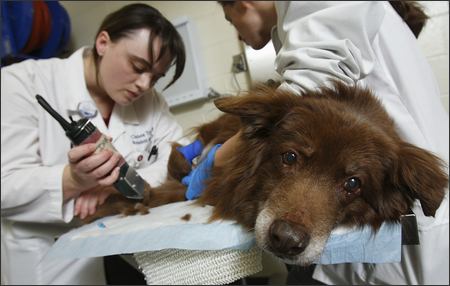
Dr. Chelsea Tripp, a resident of oncology, shaves the leg of Amber while preparing her for a dose of chemotherapy to treat her bladder cancer at the Veterinary Teaching Hospital at Washington State University in December. She is assisted by student Shannon Urza. (Photo by Andy Rogers/P-I)
From the Seattle PI Local (on-line) by P-I reporter Tom Paulson
It’s a big ‘give-back’ to dogs for cancer help
The bone marrow or stem cell transplant, a procedure that every year saves tens of thousands of lives and won for the Seattle physician who pioneered it the 1990 Nobel Prize in Medicine, appears poised to come full circle and finally become more widely available to those who first made it all possible.
Dogs.
“They helped us figure out how to help save ourselves, and so this represents a big give-back to the canine species,” said Dr. Jeffrey Bryan, a veterinary oncologist at Washington State University.
Bryan is spearheading a project to soon launch what would be the world’s first large-scale clinical transplant program for dogs. The program is expected to become available to treat dogs with lymphoma sometime this summer…
The WSU transplant program, which will be a partnership with a private business based in North Carolina, is intended to make the procedures available to pet owners for about $15,000 to $20,000 per dog. That’s pricey, Bryan acknowledged, but there appears to be enough demand among pet owners to support the program.
We could never have done this in the first place without dogs, said Dr. Rainer Storb, head of transplant biology at the Fred Hutchinson Cancer Research Center and one of the original members of the team of Seattle scientists led by Nobel Laureate Dr. E. Donnall Thomas that worked to perfect the procedure in humans during the 1960s and ’70s.
To read more about this amazing milestone, please follow this link.








